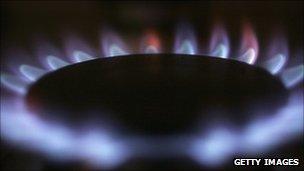One in four face fuel poverty, says Consumer Focus
- Published

Official fuel poverty figures feature a significant time-lag
The proportion of homes in fuel poverty in England and Wales has risen from 18% to 24% in two years, estimates suggest.
Consumer Focus calculated that nearly 5.7 million households are in fuel poverty - when more than 10% of their disposable income is spent on fuel.
The watchdog said the issue was particularly acute in Wales, where 41% of households were in fuel poverty.
A number of subsidies are available to householders to help them make homes more efficient and cut bills.
Consumer Focus called on the UK government to support a new energy efficiency programme in England.
The Welsh government said it was committed to tackling fuel poverty, with schemes including Arbed, a £60m investment in improving energy efficiency in some of the most deprived areas of Wales.
"Our programmes also ensure that householders struggling to keep their homes warm can receive advice on debt and maximising their income, for example with benefit entitlement checks," said a spokesman.
Calculations
The estimates are based on the most recent official government figures on fuel poverty, which date from 2009.
Energy price rises, changes to household income and alterations to household energy efficiency were then factored in.
"Recent energy price rises have pushed many more people across the country into fuel poverty," said Audrey Gallacher, director of energy at Consumer Focus.
"It is difficult to see how the government is going to meet its target to end fuel poverty by 2016.
"With so many people struggling to afford their energy bills, we urge the government to use the proceeds from new carbon taxes to support a national energy efficiency programme to give extra help to those who need it."
A spokewoman for the Department of Energy and Climate Change said: "Global gas prices have gone up, pushing up bills this year but we are making help available for pensioners and others on low incomes to keep warm more affordably.
"The answer in the long run is to help people use less energy, which is what the Green Deal from next year is about, which will have extra help to those who need it most."
- Published25 July 2011
- Published1 December 2011
- Published20 November 2012
- Published27 July 2011
- Published31 October 2011